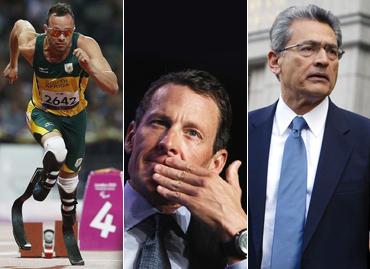 | « Back to article | Print this article |
 Wherever you look, heroism seems to be on the retreat. Is this a modern malaise or are heroes doomed to fall, asks Arundhuti Dasgupta.
Wherever you look, heroism seems to be on the retreat. Is this a modern malaise or are heroes doomed to fall, asks Arundhuti Dasgupta.
Over the past year and a few more we have seen the halo around many a modern-day hero flicker and dim. Rajat Gupta, Lance Armstrong, David Petraeus, Tiger Woods and most recently Oscar Pistorius -- anointed kings of their chosen trade -- have all faltered at the altar. Their crowns have been snatched by the same mobs that once led them to the throne.
Are heroes today more fallible or were they always this way? Does heroism come with a sell-by date? Let us, for the sake of an argument, consider a sample from the global pantheon: Hercules, Odysseus, Agamemnon, Achilles, Ram, Arjun, Yudhisthir and put them through a perfection detector, or an agnipariksha, if you will. None would emerge unscathed by the fire.
Hercules, for instance, was among those rare heroes of the Occident who were granted immortality and a place among the gods but even he was not spared his share of flaws. As a hero, he vanquished monsters, slayed dragons, and fought with death. Throughout his heroic endeavours, however, he was slave to lust and greed. He raped women and plundered cities.
Agamemnon, great warrior and inspiring general who led the Greeks in the battle against Troy, was similarly afflicted. His fatal fault, however, was that he killed his daughter Iphigena because the ships wouldn’t sail to Troy without the blood sacrifice. Agamemnon offered up his family to the wind gods for the greater good of his soldiers.
Indian heroes swim in the same pool. Ram is Maryada Purshottam, the man by which other men are still asked to live their lives. He was the ultimate ruler, just and benign. But as a husband and father, he fared miserably.
Sita underwent a trial by fire to prove her purity. And when she was pregnant, he banished her to the forest just because a subject expressed reservations about her chastity.
The heroes of The Mahabharata wear an even darker shade of grey. Great warriors and just kings but when it comes to dealing with society or women, they stain their reputation through a display of lust, anger and vanity. Karna, Arjun and Yudishthira are examples in point.
The fact is that heroes are created with feet of clay. They fail, they fall and they reveal the faults that separate them from the divine. Lord Raglan, anthropologist and linguist, described a 22-point pattern for the hero in his book (The Hero: A Study in Tradition Myth and Drama, Methuen and Company Ltd., London 1936).
According to him, every hero loses “favour with the gods and is driven from home and city”. Hercules was plagued by misfortune because Zeus’s wife Hera wanted him dead. Similarly Arjun, warrior and archer par excellence, upset Urvashi, an apsara, who cursed him that he would lose his manhood. Of course, in the tradition of Indian epics where nothing is as it seems, Arjun managed to negotiate a better deal and used the curse to his advantage.
In the ancient world, heroes were skilled in battle but in the modern context, a hero’s prowess is demonstrated in sport or theatre or some other professional arena. There is no doubt about the fact that a hero is a man with extraordinary gifts. His personal life is a different story. He is felled by a physical weakness as Achilles was by his heel; or diminished due to a chink in character like Ram and Yudhisthir were in their dealings with women.
The cause may be divine or human, but a hero always slips up and the consequences are usually messy public relations disasters.
Joseph Campbell (The Hero with a Thousand Faces, Fontana Press, London 1993) says: “The composite hero of the mono myth is a personage of exceptional gifts. Frequently he is honoured by his society, frequently unrecognised or disdained.
There are many reasons a hero fails and it would be impossible to go into all here but the point all scholars make is that heroism wears a multi-coloured cape. As he progresses along his journey, he appears infallible to his followers and detractors but in reality, he is edging closer to a day of reckoning. No sooner does he establishes himself to be better than other mortals than his coat of invincibility begin to unravel.
A hero is a flawed human being but it is the weaknesses -- the seemingly uncharacteristic behaviour he displays -- that embeds him in our memories.
A perfect hero is not one who does not fail but one who is remembered. As one of my professors of myth once explained, the imperfections make Ram the perfect hero. Eons after he was brought into being, she said, he still stirs up a debate. Ditto for the modern icons whose frailties are now on full display.
Image: Oscar Pistorius, Lance Armstrong and Rajat Gupta -- are heroes doomed to fall?
Photographs: Reuters